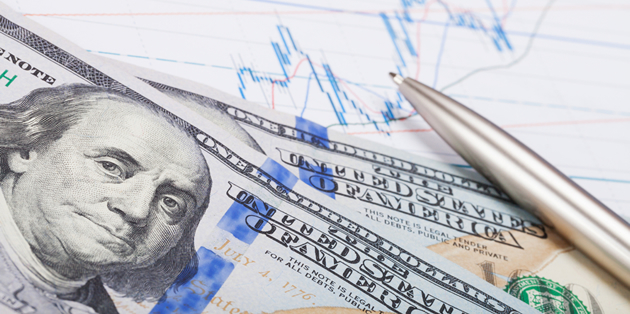- Euro Strengthens on Poor US Data – But fails to recover significantly against USD
- German Data Mixed on Tuesday – Industrial production down, trade remains strong
- US Data Meets Expectations – Wholesale inventories grow 0.1%
- Forecast: US Budget Statement Tomorrow – Follows crude oil inventories
The Euro to US Dollar exchange rate saw little considerable change during Tuesday’s session as the pair continued to trend in the region of 1.1392.
Wednesday afternoon’s US wholesale inventories report was unable to inspire particular movement in the US Dollar after it comfortably met investor expectations.
The March report indicated that inventories had left February’s negative territory of -0.6% to score the projected figure of 0.1%.
Earlier…
German Industrial Production Tanks, Euro (EUR) Stands Firm
The Euro to US Dollar (EUR/USD) exchange rate was trending in the region of 1.1391 as the European session began on Tuesday.
The pairing was little changed following the release of German Industrial Production and trade data.
Industrial production in the Eurozone’s largest economy was shown to have fallen by -1.3% on the month and increased 0.3% on the year in March, defying respective forecasts of -0.2% and 1.1%.
Meanwhile, Germany’s trade surplus increased as forecast thanks to an increase in exports and larger-than-expected decline in imports.
Further EUR/USD movement could occur later today as the US publishes its Wholesale Inventories report.
Previously…
The Euro to US Dollar (USD) exchange rate lost a narrow -45 pips during last week’s session after briefly reaching a high of 1.1608 and being ultimately shot down by a new slew of disappointing Eurozone data.
EUR/USD traded quite flatly into the weekend as both currencies floundered despite the Euro’s attempts to recover, and the pairing may be unable to move with definition until more vital datasets are released. Currently, EUR/USD still trends narrowly in the region of 1.1390.
Euro (EUR) Limps Ahead After Positive German Data
The Euro begins a new week of trading with no driving force behind its movements, following a week of underwhelming Eurozone data and amid a lack of optimism towards future European Central Bank (ECB) policies.
The ECB released its latest economic bulletin last week and the report left Euro investors uninspired. The bulletin, often indicative of potential upcoming central bank policies, contained nothing that investors didn’t know and largely reflected the ECB’s April rates meeting.
PMI and Retail Sales reports also held the shared currency down, with most key Eurozone PMI reports printing below expectations and retail sales scoring a disappointing month-on-month contraction of -0.5%.
However, Monday morning saw the release of fresh German factory orders reports for March. The month-on-month print saw February’s revised contraction of -0.8% improved to a gain of 1.9%, beating out forecasts of 0.6%. The headline year-on-year print, on the other hand, improved from February’s revised score of 0.7% to 1.7%, despite being estimated to drop to 0.1%.
Sentix’s latest investor confidence report also boosted the Euro’s defences, rising from 5.7 to 6.2 and beating out forecasts of 6.0.
US Dollar (USD) Weakens on Poor Data and Low Fed Rate Hike Bets
The US Dollar briefly saw chances to recover last week as the ISM Non-Manufacturing PMI printed well above expectations at 55.7, while the number of continuing jobless claims was lower than expected.
Unfortunately for investors, a slew of data released on Friday proved bearish enough to cause a considerable dent to Federal Reserve hike bets, headlined by the key unemployment rate remaining at 5% despite being estimated to fall to 4.9%.
The change in Non-Farm Payrolls also disappointed. Expected to move by an additional 200k in April, the report only scored 160k; well below March’s 215k.
Fortunately not all data was underwhelming, as average hourly earnings beat out expectations of 2.4% by climbing from 2.3% to 2.5% year-on-year. March’s consumer credit score was also impressive, hiking up to $29.674b from $14.145b.
Euro to US Dollar (EUR/USD) Exchange Rate Forecast: US Labour Market Data Ahead
EUR/USD could see notable movement as the week progresses despite its current fluctuations. If Eurozone data like today’s German factory orders continues to impress, the Euro could be allowed to trend higher.
German industrial production and Germany’s latest trade surplus figures are due tomorrow, with industrial production predicted to slow from 1.3% to 1.1% year-on-year, and the trade surplus estimated to improve from 20.3b to 20.6b.
US data, on the other hand, is a little less bustling than last week but will still see the release of several key prints. Due for release later on Monday is April’s labour market conditions index change report, currently predicted to narrow from -2.1 to -1.0.
This is followed by Tuesday’s wholesales inventory report for March, as well as a speech from Federal Reserve Bank of New York President William Dudley.
Dudley recently reasserted the Federal Reserve expects two interest rate hikes to occur during 2016, despite Friday’s poor job data. If he maintains a hawkish outlook, the US Dollar could recover.
The Euro to US Dollar (EUR/USD) exchange rate currently trades at around 1.1390, while the US Dollar to Euro (USD/EUR) exchange rate trends within the region of 0.8780.



